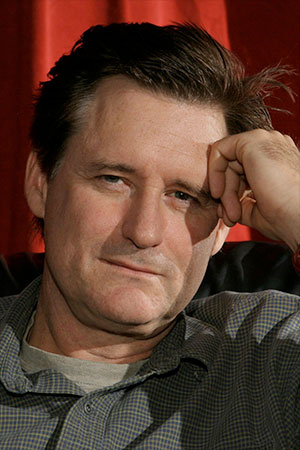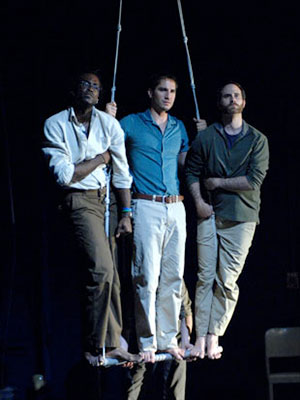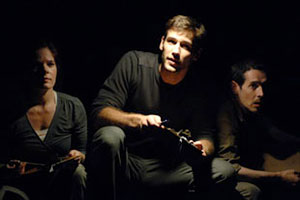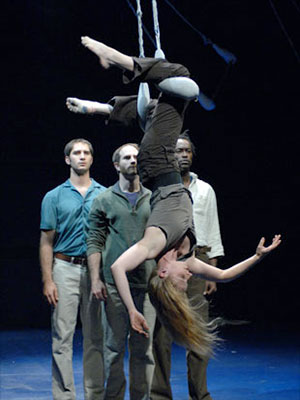September 20, 2007 — Ask the average person what the connection is between Bill Pullman and space exploration and you're likely to hear references to the sci-fi movies he has starred in, such as "Spaceballs" or "Independence Day." But the actor and director has much more invested now in the recent history of spaceflight as his own creation, the theatrical production "Expedition 6" has opened for a month engagement at the Magic Theatre in San Francisco.
Pullman recently sat down with collectSPACE to discuss his play, the lessons it is meant to convey to its audience and the appreciation he has come to inherit through it.
collectSPACE (cS): What is "Expedition 6"?
Bill Pullman: It's an odyssey story, that follows the journey of the three guys, two astronauts and cosmonaut, who were on Expedition Six that were launched in November 2002 and were up there when the Columbia was in low Earth orbit and then lost on its return, and the consequences that affected their mission and challenged them to get home.
cS: How did you first learn of Columbia's loss?
Pullman: It was a Saturday morning, and I think I was in the car driving. I had to go run to get milk and I heard the radio report. I remember pulling off to the side of the road and listening to it.
It was stunning to me. I was aware that I hadn't kept up on it. I wasn't somebody who was aware that they had even gone up. Suddenly I became hugely interested, reading everything I could the next few days. Then to realize by Monday, I saw, because it was at the same time as the build-up to the Iraq war, that the news was pushed back to the back pages, in the LA Times anyway, and that's when I saw the sidebars about Expedition Six being on the space station and now that the shuttle was grounded, looking to figure out what was the best way to get them home and what will happen to the space station.
cS: How did you get the idea to translate the experiences of the Expedition Six crew into a theatrical production?
Pullman: I had clipped a lot of articles about it that were in the paper. Then I had gone up and talked to a friend who was interested in doing something up in Denver and I went up there to meet with these eight actors that were trained in low flying trapeze. The thought of what that story would look like in this type of very minimalist theater world, with trapeze and other things, interested me.
cS: Other than the clippings, what other sources did you use for reference?
Pullman: I used a lot of Space.com, NASA.gov for the text of the piece — interviews and things like that — that happened both when they were up there as it was waiting to be determined what the mission would be and from that point on, and then when they returned to Earth.
cS: How important was it to you to capture the history of Expedition Six factually?
Pullman: I didn't really set it up to be a historic document.
I was interested in using first person accounts and data that I gathered, but I took a lot of what I call "fuging" license, in order to fill out a story that I think needs to be a larger story than just reporting about that one incident, into being a story about travelers in space.
So I used a lot of other first person accounts from astronauts who were very articulate about all the different types of components of their experience and selected the ones that intrigued me most, and used that as the central narrative, but the backbone was [Expedition Six Science Officer] Don Pettit's space chronicles.
cS: Speaking of Pettit, we heard that you recently had a chance to finally meet him and his ISS commander Ken Bowersox. How did that go?
Pullman: I was nervous! (laughs) Oh my god, I think that's why I put it off for so many years.
I had done almost all the research in 2003 and I sent it to them, the script, before talking to them not knowing what they would think. They both came back embracing of it, and also very generously offered to help tweak the things that I had kind of slugged in there that I was looking to make more accurate. I had just kind of rough stuff about certain terminology that I had kind of danced around.
And then when I got with Don and Ken, and we went through the script together, it was great. They understood the whole thing of what I was doing. You know, there were certain things I have their wives saying that were said by other astronauts' wives, but the core of things, they could recognize their own words in their interviews, and what their wives had said at other times, so they understood I was making a theater piece. There's a black guy playing Don Pettit, so it's really not a historical thing at its essence. (laughs)
But it is historical in what I get out of knowing those two guys. Meeting them made me want to bring it in line with what I was feeling about them, which was two admirable characters, incredibly interesting [and] very different.
I also had to recognize that what theater wants is conflict, and what those three were able to achieve was in fact one of the most harmonious residencies of the space station that has been up there. Yet that wasn't good for my story! (laughs) So, I had to take some tensions that I could tell happened and extrapolate upon them.
cS: How much has your vision for "Expedition 6" changed since you first came up with the idea in 2003?
Pullman: I had really kind of roughed it out there and so it's kind of changed a lot in terms of what I thought could live and then what has turned out to have to be cut out. So there has been a lot of editing. I think it could have been like a nine hour thing.
As I looked to get the thrust of it, what I was surprised to learn is what Don Pettit wrote about so elegantly, the experience of looking back at Earth and kind of what happens with your perspective. A few over 400 people have gone to space, they get to see something that no one else does. And that kind of perspective on that turbulent period of our history, American history and world history, is a lot about what the mysteries of world peace are. The kind of perspectives you can get, not Republican or Democrat, but rather the larger issue of the overarching need to call every aspect of this Earth home.
Also, in 2003, there was only so much information actually put out. Then I didn't know that this guy, Chris Jones was on the road toward writing the book "Too Far From Home," which came out in April, and then I realized there was a lot of back story, some that I had kind of intuited was going on, and some things that were really interesting to learn, that I didn't have any idea about.
cS: What do you hope those who see "Expedition 6" take away from the experience?
Pullman: It's become a harder and harder thing to see that the essential mission is to make things look routine so that it doesn't look like it is dangerous or for it to some how become sensationalist. That's the nature of science, and the nature of investigation and research. That fact has meant that the drama of what people are watching when watching a space event when it happens is reduced. And what you get is this incredible paradigm of teamwork.
I think what people working in or interested in the space program have [to take from "Expedition 6"], as much as they are in to the technology and its intricacies, is the incredible scale of this cooperative venture. So I think that people coming who are space enthusiasts will see that nature of teamwork, and I think people who are coming to it maybe not knowing much about it, may get a sense of the kind of perspective that comes out of that teamwork.
cS: "Expedition 6" is open through October 7 at the Magic Theatre. Do you have ideas for what happens to it next?
Pullman: I'll wait to hear what people think.
I've been really so lucky and blessed to have the support of some people in the Bay Area who are in the technology and science sectors. In a way, they have been more supportive than a lot of the theater companies.
When I was kind of smelling it around different parts of the country, I was waiting for a theater person to bite, but actually the first people who really thought that this is important work was led by Ken and Debbie Winans. He's an investment banker in Marin County, but they have a huge interest in the space program. They have the W Foundation that does exhibits with space artifacts. They really got behind ["Expedition 6"] and they head it up as executive producers of the play and they helped raise the extra money we needed to put it together here and make it happen.
So I am hoping that, if the thing is received well, then we'll have an easier traction taking it around. I think we're going to start with science people and museums and things in Denver, Seattle, Houston. NASA itself is a hard company to sell, and it wouldn't surprise me at all if they did not think of [the good it could do] at all, but the piece is really, really supportive of their mission and is not raking anybody over the coals.
cS: Why do you think that NASA didn't make more of the story itself?
Pullman: That's part of the culture at NASA I think that is admirable, in that they don't look to glorify themselves and no particular individuals seem to lionize what they did in any way that would look like they were doing what anybody else wouldn't have done up there. I am so moved when I sense those core values in Don and Ken when they talk about Endeavour's recent mission. No one was saying, 'Oh, I've got a better story than that!', it's just an honored tradition that you listen and you really respect everybody's accounts when they come back here.
Which makes it also kind of daunting to find those times when there was a feat of collective action between an international coalition of forces to pull something off that was beautiful and quite stunning at the same time that the world was being torn apart.
cS: You speak very highly of NASA. Have you found, as a result of this play, that you are a space enthusiast?
Pullman: (laughs) You're talking about the virus that gets in you, the disease? When you realize you are being taken over by some other thing? Yes... it can't be avoided. I've gotten myself on the board of Ken Winans' W Foundation, so I am going to be helping them with their exhibits. And I have made some friends with a couple of the astronauts, one on STS-123 is going up next January, so I am hoping to go to the launch with Box [Johnson] aboard.
(Pause) Uh oh, my wife is going to say, 'I thought you were done with that project?' but its addictive! Part of it is that the challenges, just intellectually, get so stimulating and even if it's vicarious, it just activates your mind in some ways that a lot of things don't.
cS: Do you want to fly in space? Perhaps as a tourist?
Pullman: Somebody else asked me that and I said, 'No.', just because I thought I am so aware of how someone like Barb Morgan, who waits something like 22 years to go into space, I would feel selfish if I bought my way in. I just so honor all the people who give their whole lives to it and I'd feel like I would be taking the seat of somebody else who did. So there's a part of me that would say no.
Then there is that other part... who would elbow the hell out of anyone to get there! (laughs).
cS: You mentioned earlier the W Foundation and space artifacts. Do you own something from Expedition Six?
BP: No, no I don't. I haven't been keyed in to that side of it. I mean, I own a picture of the three guys that they signed. To me, the gift that I got was when I was there visiting, we went into the Soyuz mock-up. They said, 'Here, take [Nikolai] Badurin's seat here,' and I had Don on my right and Ken on my left, my knees up to my jaw, and for a half hour we were in there, as they told the story of the descent. And that was the high point of my life. I have never heard a story better told in a more captivating environment. Talk about sealed inside a bubble, just really living it, every word and every thing they went into.
And to look left and right and to see the faces of the guys who were going through up to nine Gs was an incredible, psychedelic experience, with molten metal dripping off the windows, the comm system going wacky, it was just wild. I feel like I got a piece of that expedition that I could really treasure.
"Expedition 6": Magic Theatre, Building D, Fort Mason Center, San Francisco. Tickets: $20-$45, with sliding scale tickets ($5-$25) available a half hour before curtain. Call (415) 441-8822 or go to magictheatre.org. |
|

Actor and Expedition 6 playwright Bill Pullman. (Magic Theatre)

Robert Karma Robinson, Justin Walvoord and Brent Rose as the three astronauts of "Expedition 6." (David Allen Studio)

Sally Clawson, John Behlmann, and Karl Hanover perform in the world premiere production of "Expedition 6." (David Allen Studio)

Arwen Anderson (on the trapeze), Robert Karma Robinson, Justin Walvoord and Brent Rose in the world premiere production of "Expedition 6." (David Allen Studio) |
